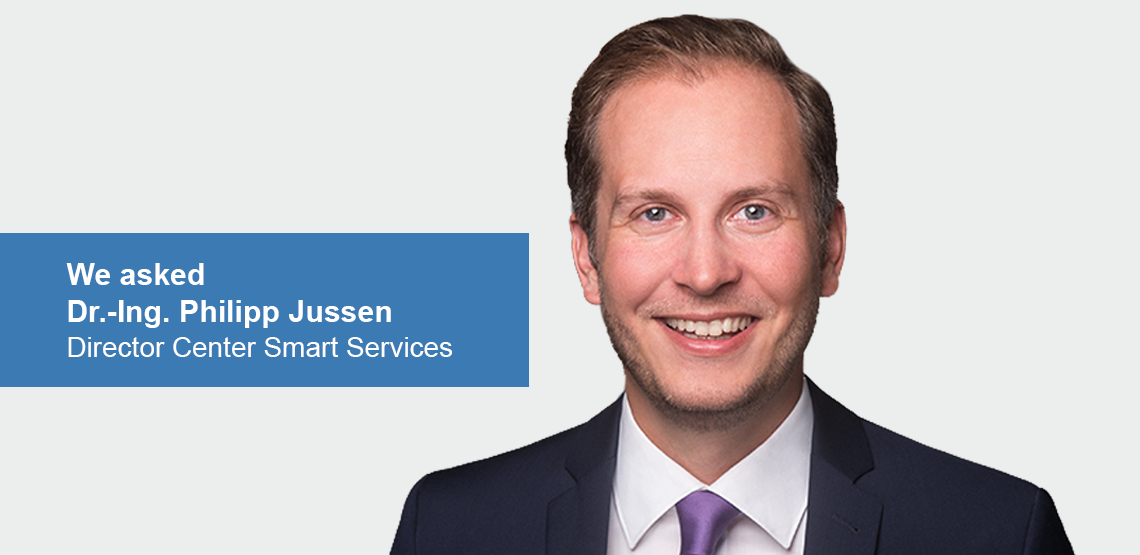17. May 2018
The Center Smart Services in the Smart Logistics Cluster conducts research in the area of digital business models and the use of data analytics in the manufacturing industry. The interview with Dr. Philipp Jussen, Head of the Center Smart Services, offers insights of what the center actually does and the vision it follows.
What are Smart Services?
Smart Services are the highest development stage of data-based services. They are characterized by two things. On the one hand, the use of modern processes in the area of artificial intelligence and machine learning plays an important role in generating information and knowledge from data and to e.g. develop forecast models to support decision-making processes. Typical use cases are predictive maintenance or the monitoring and prediction of process quality in a production process. On the other hand, Smart Services are often provided on a platform basis. These platforms form the technical infrastructure for offering Smart Services. They allow digital cooperation within an eco-system and facilitate digital business models in traditional B2B sectors like machine and system engineering.
What led you to joining the Center Smart Services? Since when have you been working for the Center Smart Services?
I studied Industrial Engineering and Mechanical Engineering at RWTH Aachen. I became interested in issues concerning digital business models in the context of communities during my time at university. After graduation, I looked for a work environment in which I could take on responsibility early on and which would allow me to shape the content of innovative, exciting topics. I found FIR e.V. at RWTH Aachen and joined the Service Management unit. FIR is a research institute focusing on organizational and management issues in the area of digitalization. I started as a research assistant. I have been in charge of the Service Management unit for three years now. I joined the Center Smart Services at the time of its inception in 2016 and assisted in its development. I have been responsible for the center since 2017 in the role of managing director. Our Smart Service Engineering approach was developed in close cooperation with FIR at RWTH Aachen.
What is it that excites you about working in the Center Smart Services?
We had the great fortune to be involved in the research for and the development of digitalization and the effects and opportunities for manufacturing companies relatively early. Today, we can share a lot of that knowledge with businesses and are receiving a lot of great feedback for our efforts every day. As somewhat of a free “Thank You”, we receive new and interesting topics for our work from those businesses that we approach with plenty of enthusiasm. For example: we recognized quite early on that businesses in the sector for machine and system engineering needed an entirely new development approach for their digital business. The core question here was how we could ensure business success in a sector that was largely unknown to machine and system engineers. Our answer is the Smart Service Engineering approach. It is based on an agile method with early trials and therefore quick learning effects. Businesses using this approach are market-ready up to six times faster than with conventional development approaches. These quick successes have a great motivational effect on our colleagues in the associated businesses – and their enthusiasm then spreads quickly. These successes are the only way that the development of a sustainable digital business or the digital transformation of entire business units will succeed. Even if we deal with the topic area of digitalization – close cooperation with people, who share our enthusiasm and curiosity for a specific topic, will always be the deciding factor.
That sounds a bit like business consulting – or is there a difference between conventional consulting services and the Center Smart Services?
Of course we also support businesses in bilateral consulting projects. The core mission of the center are, however, consortial projects that are funded by multiple businesses. In these projects, we work jointly with these businesses on complex issues. Thanks to the unique infrastructure of the Smart Logistics Cluster, we have the option to accompany these projects to the concept stage – as is the usual for business consulting services – or all the way to market readiness. We see ourselves as an operator and organizer of a network that accompanies and supports its members for several years and ensures the sustainable implementation of digital business models.
Do you specialize on a particular industry sector?
Yes and no. Our model can be applied in many sectors, but our expertise is mainly in the sector for manufacturing industry. That affinity is also clearly reflected in the members of our community. Businesses from the sectors for system engineering, medical technology, laser technology, software development, data analysis, logistics, agricultural machinery and many more are represented.
What are your plans for the future of the Center Smart Services?
Our primary objective is to create measurable added value for the manufacturing industry. That entails facilitating many manufacturing companies to get digital offers to market faster. In partnership with our members, we will focus even more on the implementation of digital service offerings to provide businesses a time advantage for market readiness.
Find further information here.


